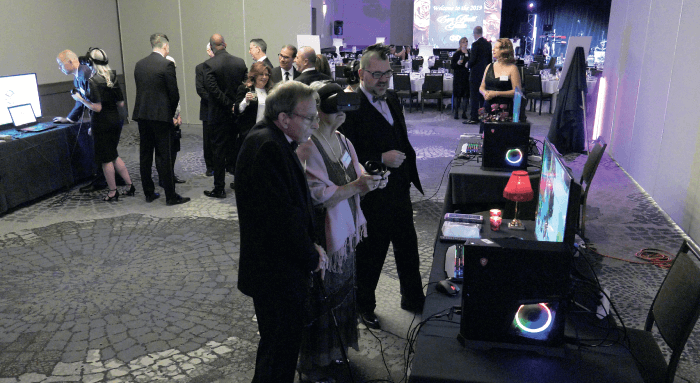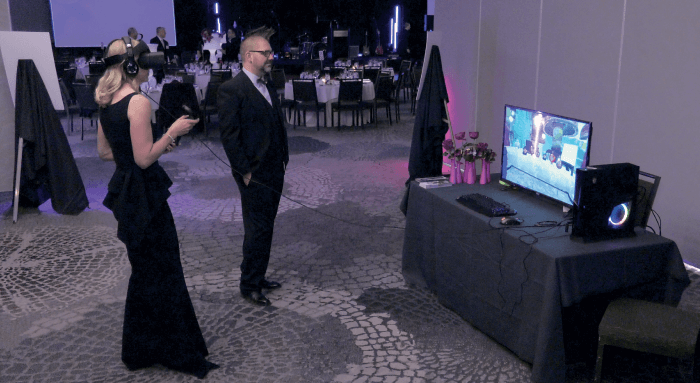
I have a strong interest in how virtual reality (VR) and augmented reality (AR) technology could play a role in my practice as an ophthalmologist and help the patients we see at the Eye Institute of Alberta. Typically, when I talk with patients about the conditions that they are living with, I’m limited to paper brochures and videos to help demonstrate what to expect with and without treatment.
At the end of 2019, the Department of Ophthalmology & Visual Sciences at the University of Alberta and the Eye Institute of Alberta held its second annual Eye Ball Gala to raise awareness and support for patient care and research. At this event, we had the opportunity to premiere a new virtual experience we called Through the Looking Glass. Through this immersive VR experience, guests at the gala had an opportunity to explore Wonderland and complete tasks while patterns of vision loss were simulated representing what can take place with untreated ocular degenerative diseases such as macular degeneration, cataracts, glaucoma, diabetic eye disease and inherited retinal conditions.
We partnered with Edmonton-based company KOVR to develop Through the Looking Glass, with generous grant support from the Odd Fellow Rebekah Visual Research Foundation of Alberta. What we quickly discovered was that the application of this virtual experience extends to many areas of a patient’s journey. What started off as a way to show others what life is like when living with an ocular disease has turned into an opportunity for further education to help patents and their families gain a better understanding of what it means to live with vision loss.
This is important because it’s not only patients’ eyesight that’s affected, it’s also the challenges that arise for the family and other loved ones when someone is facing visual impairment. When family members better understand the experience of loved ones with ocular degeneration, it helps strengthen commitments to following through on appointments and treatments. This can also motivate and empower family members who might be at risk to seek preventative care.
In Through the Looking Glass, the user enters Wonderland and picks one of three mirrors, each representing a different condition. In this program, we were able to simulate glaucoma (which starts with impairment at the periphery of the visual field), macular degeneration (which impacts the center of the visual field) and cataracts (characterized by blur and glare). The condition deteriorates as the user continues through their journey, making it challenging to navigate as vision loss proceeds.
Aaron Clifford, senior producer at KOVR, commented that the world created by Lewis Carroll was an obvious choice. “Everything in Wonderland is about perception,” he noted. “I can’t think of a more perfect way to express how our perceptions can affect us in our daily lives.”
The applications of this program are numerous. We created Wonderland as an entertaining and fun environment for the event, but we can trim away the theme and still have a highly accurate VR depiction of three common ocular patterns of vision loss. Not only can we share this with patients and their loved ones to show what to expect as their conditions progress, but we can use this program to simulate different treatment options to discover the best strategies for patients. For example, in macular degeneration, we can simulate the expected improvements in vision from medication that’s injected into the patient’s eye.
During the development process for this VR program, we consulted with researchers, doctors, technicians, and patients, along with holding critical review demonstrations with a large group of medical students at the University of Alberta. Ocular diseases are highly individualized, so not everyone will experience a condition in the same way. However, in speaking with our patients and having them try the simulations for themselves, they were able to provide us with feedback to create a more accurate depiction.

In the future, we’re envisioning a more AR-focused approach that permits users to experience these conditions in real-time and in real environments. Through a technologically enhanced set of glasses, we can overlay the simulations of the conditions onto environments, such as their homes, that patients will need to navigate as part of their daily lives.
Never before have we been at a point in technology where we can provide such a realistic, intimate representation of what a person experiences when faced with ocular degenerative disease. Fortunately, many of the conditions I assist patients with are curable or treatable. The first step in addressing any health issue is education. The better educated the patients and their families are, the more empowered they are to participate in treatment and follow-up.
Through this program, we’re taking a step in the right direction to better educate people about common ocular conditions. Patients and family members will be able to better understand what the condition is, how it will affect their lives and what treatment plans are best for their individual circumstances.

